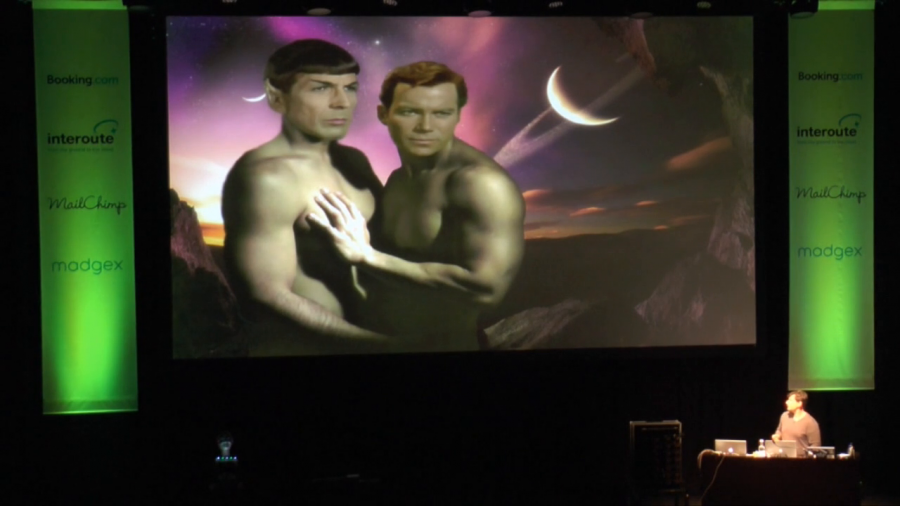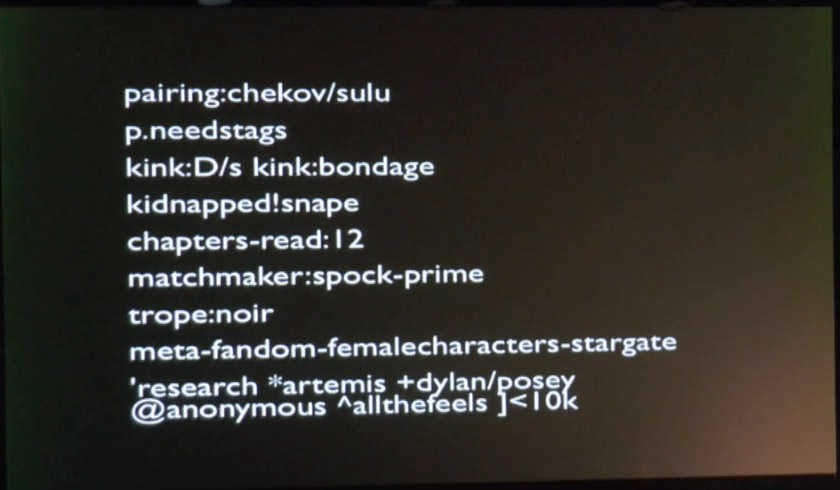Just to calibrate the audience, I want to ask three questions, and please applaud because I can’t see you very well. Please clap your hands if you’ve never heard of fanfic. [Clapping.] Okay. And please clap your hands if you’ve heard of slash and know what it is. [Clapping.] I hear a “woo.” And please clap your hands if you write fanfic. [Very little clapping.] It’s the dark! You can clap. No one can see you. Okay, thank you very much.
So in 1967, I think it was, when Gene Roddenberry brought Star Trek out into the world, he created this cultural phenomenon and it wasn’t really apparent at the time; the series wasn’t that popular. But the people who were into it really really really got into it. There’s something about this idea of a multi-ethnic, multi-cultural, very good-looking group of people wandering the universe, applying the Prime Directive and the occasional phaser set to stun to the galactic problems of the day that just captures the imagination. And of course the hero of the show was Captain James Tiberius Kirk, a very passionate man. You could say he was sort of a space harlot who whether your skin was white or black or green or blue, it didn’t matter. You knew that you were welcome in the Captain’s quarters. But you also knew that come the next episode you would be forgotten. Because at the emotional heart of the show was the relationship between the stormy Captain and his ice-cold, calm and collected Mr. Spock. So it was a relationship between two men, or more precisely, one and a half men and one half of a Vulcan, that was the motor of Star Trek.
This was the 60s so you’re not really allowed to have subtext back then. I mean, there was a show called I Dream of Genie where an American military officer has full control of a scantily-clad blonde woman who lives in a bottle and does his bidding, and yet there was no innuendo there. So I mean, you know, you can’t have any, let alone homoerotic, innuendo.
But you know, fans are smart and the kind of people who wrote stories about Star Trek (and this started early on) saw through this ruse and understood that other fanfic writers wanted to read about man going boldly where man has never gone before, or Vulcan for that matter. So this unfortunately caused a rift not in the space-time continuum but it nearly tore the Star Trek fandom asunder and was discussed heavily in the early 70s at a conference where there was a big kerfuffle about fanfic authors (who’re primarily heterosexual women) writing these incredibly racy stories about Kirk vs. Spock. It was such a phenomenon that it became known as The Premise, or later on “K/S” for Kick and Spock and that slash became the generic cover-all term for fiction that was homoerotic between these male protagonists. Starsky and Hutch was kinda the next one up. You had a lot of great potential in those old TV shows.
So slash was very underground to begin with. You had to work pretty hard to find this stuff. You couldn’t just send away for it because fans were very conscious of the fact that Gene Roddenberry wasn’t going to be looking too happily on hardcore homosexual erotica about his family-friendly TV show. But it was there, and as fandom moved from the world of zines and photocopies to mailing lists and Usenet and then onto the Internet and kind of found its Nirvana and its millennium in LiveJournal during a few years before LiveJournal made a huge mistake and alienated fandom, slash became more and more close to the surface, because it got more and more obvious that people really dug this stuff.
There’s almost a cliche in the world of fan fiction about people expounding on slash. Why do people write this and why do people read it? And I kind of agree that it’s a silly thing. I’m not going to come up on stage and talk to you at length about why heterosexual men view videos of two women making out and find that appealing. But for some reason people feel the need to explain slash as a cultural phenomenon and you know, “What is is that makes it so fun to write and read?” I’m just going to accept it as it is and you’re probably wondering at this point, “What is this weird Polish-named guy doing up here talking about Kirk drilling Spock?” And some of you are like, “That’s fine, please continue. Do you have more slides?”
I’m here by way of atonement, because I used to be a real jerk about fandom, and I used to make fun of them, and think they were wasting their time. And then I had this kinda life-changing come-to-Jesus moment that I want to talk to you about and this really weird artifact that got produced partly because of me, and it’s completely changed my thinking. And as I’ve gotten to know fandom and really like them, I’ve come to believe that they kind of represent a future and a model for what communities are like on the Internet when you have actual people using machines to talk to one another rather than this kind of invented sense of what social life and social networks are supposed to be like, the way we’ve engineered them.
So let me give you just a tiny little bit of background about me and my involvement.
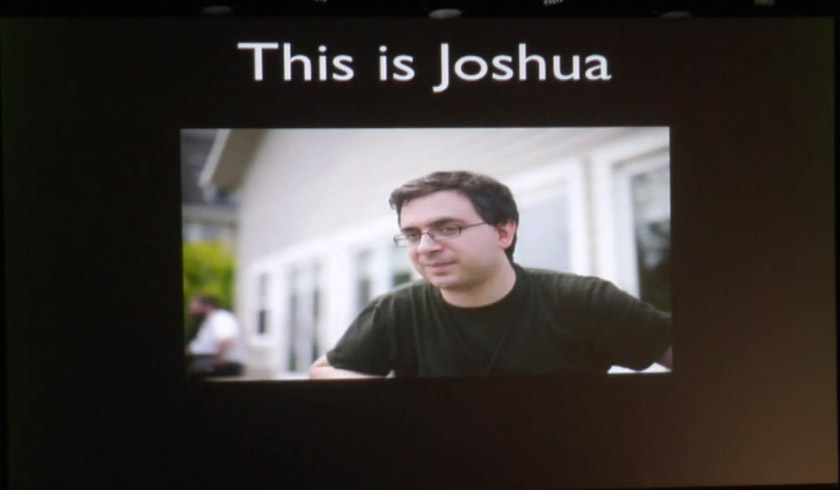
This is Joshua Schachter. In 2004 he wrote a website called Delicious. Anybody use Delicious in the past or present? [Clapping.] Alright, yes is the answer. It was the first social bookmarking site. The really innovative thing about it was not just that people can kind of bookmark things of interest and see what other people are bookmarking, but he had this “tags” field, which at the time no one had really done except Flickr, that came out at roughly the same time. And the tags field, I remember not knowing what it was for. He explained it to me basically as a search engine in reverse. Rather than typing in something to find results, when you save something for later, why don’t you type down the the stuff that you’re going to probably use as keywords when you look for it long after it’s forgotten? Blew my mind, but what blew everybody’s mind was the fact that when you collected tags from a bunch of different people, even if you didn’t tell them any instructions about what to do or what vocabulary to use and all that, you still got really great results. The more people tagged stuff, the more relevant and descriptive the collective tags for stuff would be.
Joshua took that straight to Yahoo!. Yahoo! at the time had rooms full of people whose job it was to categorize web sites. They had been a web directory originally and were still trying to kinda do this as the web was growing, and he said you can do this kind of Tom Sawyer-style. Have everybody whitewash the fence for you. Collect this data, wrap advertising around it, give it back to them and you’re going to win. And Flickr and Delicious, Yahoo! bought them both for that reason. Some years down the line, I was talking to Britta Gustafson, wonderful woman, really great diplomat. She can jiu jitsu even the most toxic people, including myself. And we were talking about tags on Delicious and she said, “You should look at the fanfic people. They’re doing crazy stuff.” And I was, “[Groan] the fanfic. Come on. Lame.” And she said, “Listen to me. Why don’t you go take a look at what I just said.”
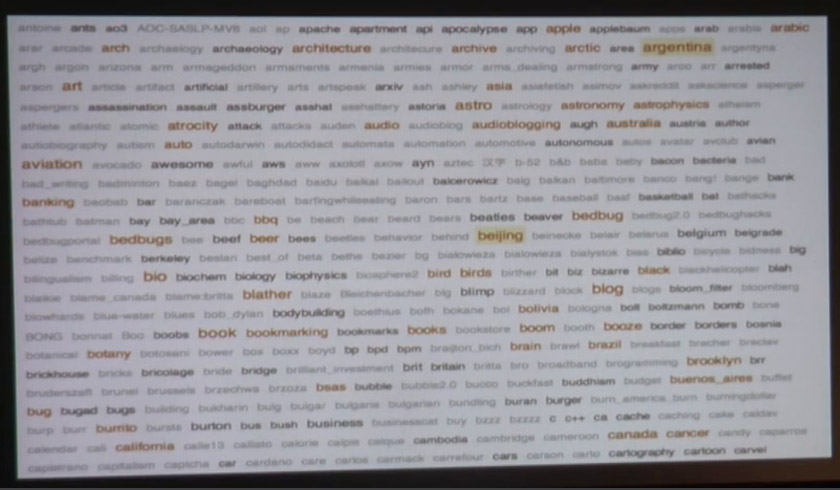
This morning I pulled up my own tag cloud from Pinboard. This is kind of typical of what tagging is for non-fanfic people. Over the years, I’ve accrued the weirdest tags. I just type anything that comes to my mind. I have no discipline about it. Some people are much more focused when they tag. They treat it like folders; maybe they only have ten or twelve tags that they fit everything into. But the fanfic people, they trumped us all. What they basically did is they came up with a set of conventions that allowed them to turn Delicious into a custom search engine for fan fiction. So let me give you some examples of that.
Some of the obvious stuff. You have pairings. When you get into fandom you understand that there’s people kind of centered around different shows, and then everybody has their own favorite pairing. Maybe you’re a Harry and Draco Malfoy sort of person, or maybe you’re a traditionalist so it’s Kirk and Spock for you even though it’s been years and years. The other thing I need to explain is in Delicious you could compose tags, so you could stack them one on top of the other (no innuendo intended) and then you would get a filter of stuff that matched only those criteria. So this was a way you could subscribe to the newest stories. And people, they produced massive amounts of fictions so you could really filter it down and still get new things.
So you could filter by pairing, there’s these kind of metatags, like “this hasn’t been categorized yet,” so you know, “needstags”. Kink; you can be very specific. “I’m into dominance and submission” or you could have a foot fetish, or “I want to read about bondage.” This cool exclamation point syntax that originated from fandom where could have a character, but something unusual happens to them that’s not really in the story, so here Snape has been kidnapped by someone. I wonder what they’re going to do with him.
This is one I like a lot, which is “chapters-read”, like it’s a long piece of fiction, how far have you gotten. The “matchmaker” one is kinda cool. Spock Prime, who knew that Spoke Prime was a little go-to, who would actually be the one who got Kirk and Spock Regular together?
Things are categorized by tropes. Some people use it almost as a hierarchy. So this is one woman’s tag that’s got five layers in it. It’s meta fandom female characters and then Stargate as the specific show.
And then my favorite example, at the bottom, took advantage of the fact that there’s auto-complete in this interface, so when you type the first character you see a list of the tags that start with it. So she was very careful to categorize things so the apostrophe meant it was a general category, the star meant what character in the story, the plus was for pairings, the @ is for the actual author of the fic (in this case it’s anonymous). The caret was for her commentary, “allthefeels” meaning this is a real emotional rollercoaster on this one. And then word count. So if you want stuff that’s less than 10,000 words long, you put in that tag.
It’s incredible how much effort they put into them. Because everybody was using roughly the same conventions they could find one another’s fic through Delicious.
So around 2009, I started a web site called Pinboard which was a bookmarking site. Basically, Delicious redesigned in a way that I hated and in order to not just complain all the time, I tried to make my own version of what I used to like in Delicious. And I really wanted to seduce these fans with their amazing tags, but they were really attached. Delicious had this Firefox plugin that was super-fancy. They had all their stuff there. They’re sentimental people to begin with. So I didn’t really have any success in getting the fans to come over, until these two fools kind of looked at each other.
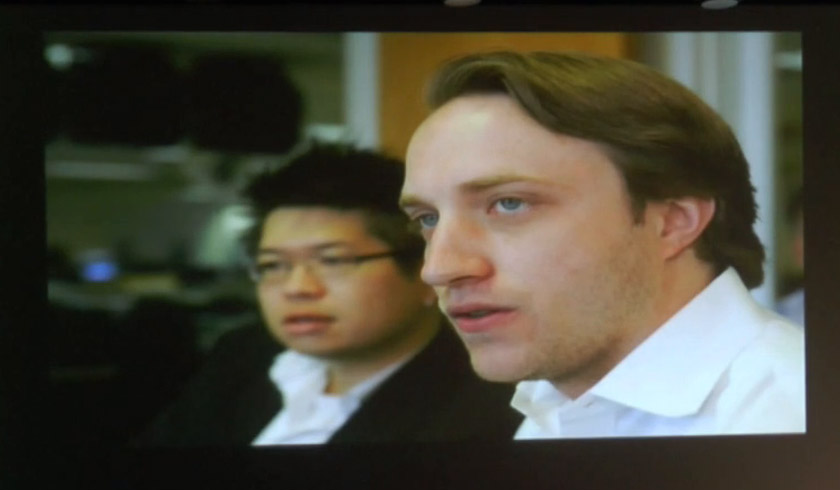
They’re the YouTube founders, Chad Hurley and Steven Chen. Maybe they’re wonderful people, kind to animals, beloved by children. I don’t know them personally, but they kind of bungled their way through the Delicious purchase. Like, Chad looked at Steve and was like, “Brooo, you wanna buy Delicious?” and Steve’s like, “Bro, totally, let’s buy it.”
And so they bought it and they poured a lot of money into it, and then they had this uncloaking of their new design. And part of the new design was destroying a lot of features that the fans really loved. So one thing, they got rid of the support forum, so you couldn’t publicly complain about anything. And then they got rid of the ability to see all your tags, which you can imagine for someone with a system like that is just terrible. But the thing that killed fandom on Delicious was you couldn’t put the slash tag into the search box anymore. So you know, there is no God, life has no meaning, it’s over when you can search on the slash tag.
Being a canny businessman, I tweeted to the world a gentle reminder that I had through hard work enabled Unicode support for the “/” tag.
https://mobile.twitter.com/Pinboard/status/118723536222302208
So fandom kind of dispatched a probe to see if I was worth further study. And they talked to me a bit and they’re like, “Well you know, there’s some stuff that is missing that we really rely heavily upon.” And in my foolishness I said, “Could you make a list? I’ll take a look. Maybe some of it is easy to implement.” And I kind of started this monster.
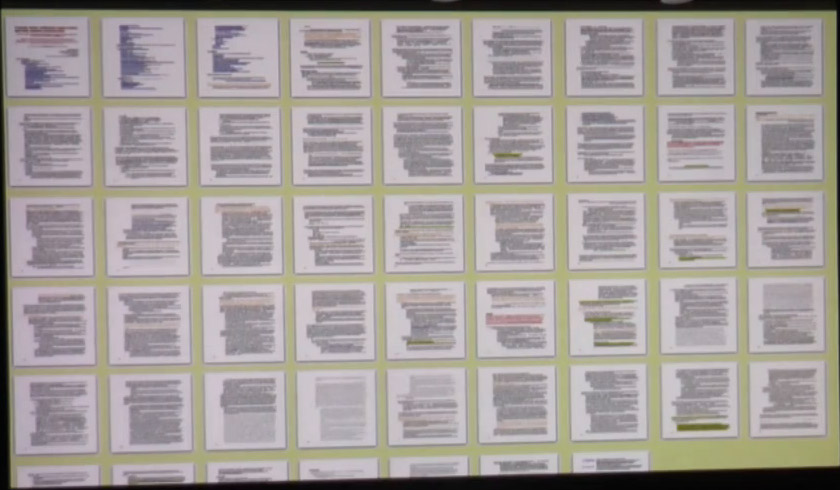
So for three days I watched this Google Doc grow. It ended up being fifty-two pages long. And I wanted to show you some of the highlights of it.
You know, Google engineers this stuff pretty heavily, but at certain times it was locked because there were too many people editing it concurrently. There were always at least fifty viewers, but sometimes it was just read-only because there were however many people trying to make changes. These are all anonymous users, but they somehow seemed to know each other? So here’s the first page of it.
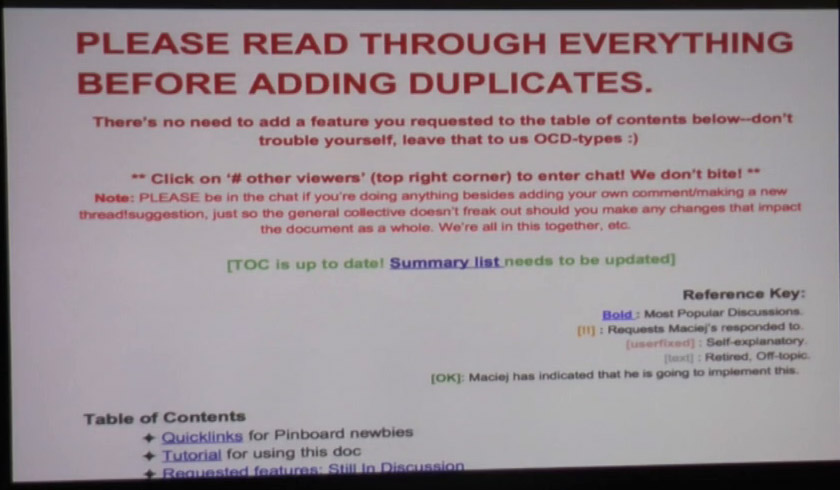
So, first instruction “read the entire thing before you do anything.” And then instructions about how you have to be in chat now, please don’t insert anything in the table of contents because there’s a really OCD person who’s doing just that and you’re not as OCD so just relax. And then the friendly color-coding and everything like that.
So you had to study this document before you contributed to it at all. And basically it consisted of all these feature requests and then people would vote on it, but they would vote on it by just typing in a little arrow and their vote afterwards, and there’s nothing to keep track of who had written what but somehow they managed it anyway? And I was really afraid of what was happening so I ventured into this document and I made my text orange so I’d be kind of faint, but I started having discussions with people. So here you have a back and forth where someone requests something and I reply at length and then they decide, “Hey I’ll just build an app, for example, that maps Delicious usernames to Pinboard ones because that’ll be handy” and you know the other fans will appreciate it, so someone built an app on Heroku and put it up, and put a link into it into this document that’s spiraling out of control.
And then one of the nicest bits here [page 53] is there’s a warning saying “Please don’t slash Maciej. He’s not okay with it. We want him to like us.” and there’s this debate about whether it’s okay to write slash fiction about me, or Pinboard in a fictional representation and why that’s going to alienate me. I was just laughing. It’s wonderful, right? And also someone has already written a fic about the writing of this document and they’ve linked it back in a meta sort of thing. And then someone else asks for a feature and then they just put Javascript right in [page 46], “Oh yeah that’s easily fixable. I’m going to go ahead and do that.”
So someone had created a tutorial for how to write this document. Someone else, all she did was indent and fix the indents and was thanked for it. There’s a credits section, there’s an index, it’s cross-referenced. MLA-style citations. This thing is intense. And at the very end of it people start putting thank-yous and they change the text color for different users. So I’d like to very briefly give a dramatic reading of the fic that was written about Pinboard.
It was almost noon when Pinboard stumbled into the office, eyes bleary. His shirt, Delicious noted, was buttoned crooked.
“And where have YOU been all morning?” Delicious asked. The split-second glance away from the computer had been a bad idea; there was already a full screen of new complaints in his inbox.
“Nothing much,” Pinboard said as he booted up his own machine and started typing hastily.
Delicious held his finger down on the delete key until all the new messages vanished, then risked a second glance over at his office mate. Pinboard already had a dizzying array of windows open on his five monitors, but Delicious’s attention was instantly drawn to the one with multicolored text. He squinted. One of the names looked familiar–
“Hey! You’ve been talking with Fandom!”
“We had a good brainstorming session last night,” Pinboard said modestly. He reached up to push a lock of hair behind his ear. An ear, Delicious noted with horror, that had a bruise on its lobe. There were more bruises running down his neck, a line of love bites that vanished under his shirt.
Ambyr, “The Morning After“
This goes on but time constraints prevent me from reading any more. This is written by a wonderful woman whose handle is Ambyr. She graciously consented for me to give a reading here of this fic. Anyway, the point you should understand is these are wonderful people. And if you’ve ever used to dealing with anonymous users on-line, this is like a mirror world where YouTube commenters are transformed into the most supportive and friendly and mutually helpful bunch. And it completely blew my mind. So I want to run through some low-hanging fruit sort of items that you can… I know you’re sent here by your employers, you want to go back and like, you know: Lessons Learned, action items and things. So let me take a little tour there.
First of all, fans, they’re just so nice. They’re so nice. So stop being mean to them if you’ve ever been mean to them like I used to be. Because we live in a culture that celebrates a man with a metal stick spending thirty years of his life trying to hit a ball into a hole, and he’s described as courageous and there’s a story arc to his life or whatever. So a hobby where you’re just writing stories is not so weird.
Fans are important because they fight censorship. And this is a big tragedy and you know, fans love drama so they tend to dramatize their history, but they’ve had some moments. And one of them was when LiveJournal decided that in order to protect the children, the were going to ban all these communities that support criminal activity. Their definition of criminal activity was, “We’re going to look at keywords in these communities, and anything that sounds wrong, you know, incest, rape, abuse, whatever. It means you’re a criminal.” So they banned 500 communities, reinstated 350 of them eventually, but not just fans who were obviously writing their stories, but incest survivors who were discussing it… A very heavy-handed move, and fans often find themselves the first victims of this kind of thing, because the stuff they write tests boundaries. You saw just recently on Tumblr, when Tumblr, acquired by Yahoo! decided, “Oh no! Pornography, can never show it again. So we’re going to hide it. You can’t search for ‘gay’ anymore, for example, on Tumblr and have it have public results come up.” Fans are often right there in the trenches, so support them because what they’re doing is wonderful and legitimate.
Kind of in a related thing, fans fight for privacy. Fandom, it’s mostly a women’s community. They have an interesting take on privacy, and what I’ve come to understand is that fans aren’t ashamed of what they’re doing, but having the ability to have pseudonyms or a separate identity from their day-to-day one gives them freedom to write what they want and interact how they want. And we live in a time when these very centralizing sites are trying to tether us to our real names. Fans fight for this, and they also demonstrate that you can have an anonymous or pseudonymous community that’s not just full of horrible trolls as long as people interact with each other over time. So fans are fighting for our privacy.
And they never sold out, man. There were all these attempts to create fan fiction sites and you even saw one or two weeks ago, Amazon introduces Kindle Worlds, where Kindle’s graciously licensed some of these fictional realms and you can write stories about them. If you look at the terms and conditions, there can’t be any sex in them, and there’s all this other stuff. But you get some pittance of a percentage of every story you sell. And fans have taken an honest look at this, but they’re like “No, we’re just going to keep doing what we’re doing.” Which is transgressing, which is kind of awesome, and used to be what the Internet was supposed to bring us, these edgy freedoms. This is a quote from some shill at LucasFilm where he says
“We’ve been very clear all along on where we draw the line,” said Jim Ward, vice president of marketing for Lucasfilm. “We love our fans. We want them to have fun. But if in fact somebody is using our characters to create a story unto itself, that’s not in the spirit of what we think fandom is about. Fandom is about celebrating the story the way it is.”
Enh, no. Fandom is a big middle finger raised at this dude. A subculture that’s older than the Internet and is still something I can talk about to a general audience and some of you might be hearing about it for the first time, that’s pretty cool. They’ve kept it real.
Fans improve our culture. Part of the reason our television shows suck less than they used to is because people are more sophisticated about the way they watch them. There may be technological reasons for this; we can binge on stuff now dozens of episodes at a time. But there’s also a real sense in which fandom analyzes this stuff to death, deconstructs it. There’s tons of academics, librarians, professors, just general smart people no matter what their jobs are, who are in fandom and love to pick stuff apart and glue it back together in different ways. And this kind of percolates back into the culture. It creates more sophisticated viewers and that means the stuff we watch is just better.
A few more ranty items while I have a little time.
This is a big one. Social is not a syrup or a sauce or a gravy, it’s not even a noun. But we have this tendency to like, there’s these two elements right? So there’s content. Content is a tofu-like gelatinous substance, which you can cut into custom pieces. And then there’s social, which is this condiment that you pour over it. And I’ve tried to stop using the word “content” at all because I find it so objectionable. This idea that we’re going to engineer web sites and then just sprinkle social onto it and have a community. Real communities don’t work like that. Real communities are people who have long memories, and interact with each other over time, and can take your product or leave it. It’s might inconvenience them, but you’re not the boss of them. I think it’s important to remember that.
Something counter-intuitive to me was a lot of this fan stuff, they would use tools and web sites and plugins and Greasemonkey, like five things at once, and it’s really hard to get your mind around it. My instinct was couldn’t this be done more easily or more intuitively? But it’s actually the difficulty of the tools and the norms of the community [that] protect it. It takes a while. You have to be committed to start contributing because you have to learn how all this stuff works.
This isn’t just fandom. You know those awful PHP-based message boards like, I like to scuba dive so I go to the scuba board sometimes and I have no idea how to use it but there’s some really informative people on there. I think that these terrible interfaces actually serve a protective function where they keep the community isolated from just drive-by comments. If you ever go to the Guardian or the New York Times, places where you can actually comment very easily without ever having been there before, the comments are just totally trash. And I wonder sometimes if it’s because it’s too easy to do it.
Lurkers are watching you, and they outnumber everybody else, so your behavior— For example, LiveJournal didn’t think there was going to be a big deal about banning all these fans, but for every person who spoke out there were ten people who were watching to see what would happen. This is something to be really careful about. And a corollary of that is just stop futzing with it. Don’t mess with it. If you have a nice site just don’t refresh it. Just leave it, because it’s good. On LiveJournal for example, fans, a lot of them would use user icons as commentary to their posts. There’s be a one-sentence comment, but then the user icon, they would have 900 of them and they would pick the one that best complemented it. It was a form of communication. LiveJournal decided for some reason you have to limit this to whatever it was, twenty or thirty, because no reason. And so they killed this feature of their site they didn’t even understand.
Which leads to the corollary “shut up and listen.” People are using your sites in ways you might not be familiar with. Why not have a look and see what it is, or ask? People are amazingly forthcoming about it, and it’s very rare that anybody gets asked, so take advantage of it.
Breakups are really hard both on communities and on sites, like when a tight-knit community chooses to leave they really all go in one piece. Delicious, the whole thing was like a stampede away from it. Not everybody came to Pinboard, but pretty much everybody left Delicious. And this is kind of an irrevocable thing. When your site loses a community, they’re not going to come back easily because there’s such a high activation energy barrier to them leaving in the first place, you really have to exasperate them. In that way it’s a lot like human relationships. Once you move out from your spouse’s house, it’s probably because you really can’t take it anymore.
And lastly two things, or three. One, we are all fans. So whether or not you write fanfic, or have any interest in it, there’s stuff that you like to read or watch or whatever else. So let that be a guide to you to empathize with people who like to take a more active approach to it. And then, this might sound a little bit maudlin, but I think it’s true that fandom actually changes lives. Britta had a really nice way of putting it that for some young women fandom is this kind of secret seminar in feminism and is life-changing to them. For other people it has that same effect on sexuality and gender and even knowing that there’s such a thing as a gender identity that you can choose. Some people discover that through fandom. For a lot of people it’s their happy place, and it’s important to have a happy place, some place you go and you can contribute and be active and connected. We’re told that the Internet is so alienating, but communities like this prove that it’s the opposite that’s true.
So I want to just say a big hooray and yay to fandom and then encourage everybody to go see, a lot of this talk came from fanlore.org, which is run by the Organization for Transformative Works, the Archive of Our Own is what Britta calls “the friendliest damn open source project on the Internet.” The only place that will actually train you from nothing if you want to contribute, and teach you Ruby just so that you can patch this archive they’ve created. And Dreamwidth is a fan-run fork of LiveJournal that adds some features for them. And then of course every day you can see what’s popular on Pinboard among the fandom crowd on the fandom page.
So thank you all very much and thanks to all the fans who made this talk possible.
